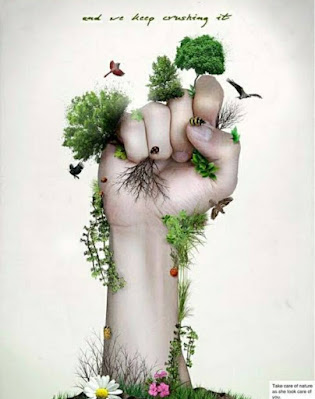Sunday Reading ; EcoCriticism
Thanking Activity:
Sunday Reading : Ecocriticism ..
Here I'm going write task about Ecocriticism...
Origin of Ecocriticism:Began in 1990s as an academic disciplineBut its origin can be found in the late 1970sThe term Ecocriticism has been coined by William Rueckert in 1978 in his essay Literature and Ecology: An Experiment in Ecocriticism.
Simply put, ecocriticism is the study of the relationship between literature and the physical environment. Just as feminist criticism examines language and literature from agender conscious perspective, and marxist criticism brings an awareness of modes of production and economic class to its reading of texts, ecocriticism takes an earth Centered approach to literary studies.
by- Cheryll Glotfeltyin- The Ecocriticism Reader: Landmarks in Literary Ecology
Ecocriticism is one of the youngest revisionist movements, which has swept the humanities over the past few decades. The present world is facing eco-disasters and our environment is now at stake. Only science and technology are not enough to combat the global ecological crisis. We should make change in our attitude to nature. Literature does not float above life, so it has its role to play. For a long time nature was not given due consideration by the literary critics, so ecologically oriented literature pleads for a better understanding of nature in its wider significance. Ecocriticism has developed as 'a worldwide emergent movement 'during the last three decades. The scholars are still engaged in developing its nature and scope. The term ecocriticism was first coined by William Rueckert in his critical writing "Literature and Ecology: An Experiment in Ecocriticism" in 1978.The word 'eco' comes from the Greek root word 'oikos' which etymologically means household or earth and 'logy' from 'logos' means logical discourse. Together they mean criticism of the house-the environment as represented in literature. According to Rueckert, ecocriticism applies ecology or ecological principles into the study of literature. And Lawrence Buell defines ecocriticism "as a study of the relationship between literature and the environment conducted in a spirit of commitment to environmentalist spraxis"(The Environmental Imagination,430).Further ecocriticism does not simply mean nature study; it has distinguished itself from conventional nature writing, first by its ethical stand and commitment to the natural world and then by making the connection between the human and the non-human world. According to Joseph Wood Krutch, Thoreau's work is not about plants or animals or birds; it is about his relation to them; one may almost say about 'himself in connection with nature.'( Henry David Thoreau 1948) Patrick D. Murphy is right in saying that Ecocriticism is literary "criticism that arises from and is oriented toward a concern with human and nonhuman interaction and interrelationship."
"Ecocriticism is a study of the relationship between literature and nature. "
" The study ok physics at a quantum level is the seientiie explonation e Spinituality with a deepe understanding of Realit. "
- Cheryll Glotfelty.
Another concern of most of the Ecocritics is anthropocentric idea. Luc Ferry suggests that nature "should be disciplined, polished, and cultivated, in short..humanized."They thinks nature as controllable by humans.
Eocriticism explores how human beings interact with then naturalworld.It analyses the treatment of humans and other elements of the ecosystem in literary texts.
Ecocritical study of a literary text offers a solution to the environmental crisis through a radical shift in human consciousness.Ecocriticism is a nature centred philosophy which opposes a anthropocentrism.
Future of Ecocriticism :
Expanded into varied fields and disciplines such as ecopsychology, eco spirituality, ecofeminism, material ecocriticism, post colonial ecocriticism, animal studiesand behaviour, literature and the environment,environmental justice, portrayal of environment in mainstream, cannonical and indigenous literature, global warming, climate change..
ECocriticism in Frost's :
Poem First comes rhythm and style that Frost mostly didn't write in free verse.He gives most of the place to nature elements like wood, trees, flower, domestic animals, land (i.e. earth).He treats nature fn both positive and negativeWays.The rural life is depicted largely in his poems.
CONCLUSION




Comments
Post a Comment